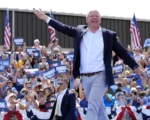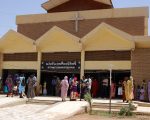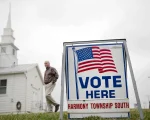News
Lutherans in Walz’s Minnesota Put Potlucks Before Politics During Divisive Election Season
The ways Midwest Lutherans live that faith in the public sphere — on social and political hot-button issues — can be as different as a marshmallow-topped hotdish from a prickly pear cactus salad.
Haitians in Ohio Find Solidarity at Church After Chaotic Week of False Pet-Eating Claims
The viral racist rumors are being fueled primarily by former President Donald Trump and his running mate JD Vance, and violent threats against the community are upending daily life in Springfield.
Hundreds March in Brazil to Support Religious Freedom As Cases of Intolerance Rise
Experts say that while most neo-Pentecostal proselytizing is peaceful, the spread of the faith has been accompanied by a surge of intolerance for traditional African-influenced religions.
Takeaways From AP’s Report Updating the Cult Massacre That Claimed Hundreds of Lives in Kenya
The evangelical leader of Good News, Paul Mackenzie, is accused of instructing his followers to starve to death for the opportunity to meet Jesus.
Lance Wallnau, First to ‘Prophesy’ Trump’s Presidency, Is Back To Vanquish Anti-Trump Demons
The modern-day 'prophet' and coiner of the phrase '7 Mountain Mandate' has helped to bring the influential Pentecostal group New Apostolic Reformation from the fringes of American Christianity to the heart of US politics.
Ferguson Activist Raised in the Black Church Showed Pastors How to Aid Young Protesters
Brittany Packnett-Cunningham’s rise to be one of her generation’s best-known racial justice activists reflects the promise and power of the ministry of her late father, who was senior pastor of St. Louis’ historic Central Baptist Church.
Where Has Trump Spiritual Adviser Paula White Gone?
The onetime organizer of the former president’s evangelical Christian advisory board has been relatively muted in her public support in the 2024 election season.
Sudanese Anglican Cathedral Is Now a Graveyard for Civil War Victims, Archbishop Says
The Sudanese civil war is the world’s largest displacement crisis today.
The Christians Who Matter Most in This Election (Hint: It’s Not White Evangelicals)
This issue of A Public Witness unpacks recent polling data and swing state demographics to explore why, despite all the media attention to evangelicals, political salvation for the Harris-Walz campaign will instead be found among mainline Protestants.
Southern Baptist Trustees Back Agency President but Warn Against Needless Controversy
Less than two months after the Southern Baptists’ policy arm issued an embarrassing retraction of an announcement of its leader’s firing, it gave him a strong vote of confidence this week.










